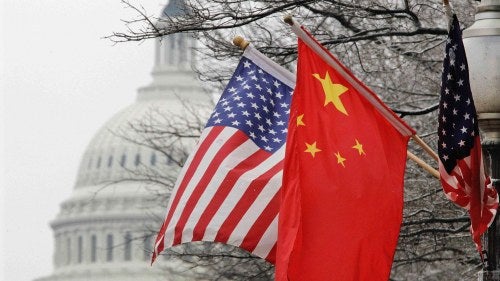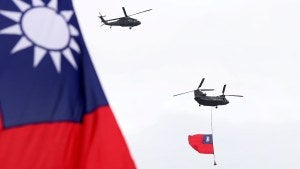AAPI Views on US-China Relations

Asian Americans are less likely than other racial or ethnic groups to say China’s rise is a “critical” threat to the United States.
As the US-China competition intensifies on all fronts—trade, defense, technology, cybersecurity, and even space—a vast majority of Americans label China as a “competitor” or “enemy” to the United States. Simultaneously, there has been a troubling increase in anti-Asian sentiment and hate crimes. Against this backdrop, understanding the US-China relationship through the perspective of the Asian American / Pacific Islander (AAPI) community is crucial.
For a second year in a row, the Chicago Council and New America have partnered on a comprehensive study of American public opinion on foreign policy with an expanded look at the opinions of various racial and ethnic communities in the United States. And as the 2023 Chicago Council Survey reveals, Asian Americans share a notably different point of view on China.
Asian Americans See China as Less of a Threat
Overall, American concerns about the rise of China are on the rise. As the 2023 Chicago Council Survey finds, a record level of Americans (58%) view China’s development as a world power as a critical threat to the vital interest of the United States, the highest level recorded in Chicago Council Surveys dating back to 1990. That includes majorities of White (60%), Black (59%), and Hispanic Americans (53%). However, among Asian Americans, 46 percent view China’s development as a world power a critical threat.
About half of White, Black, and Hispanic Americans also say US leaders are not giving the issue of US competition with China enough attention. However, only a third of AAPI Americans (36%) say so. They are more likely to say US leaders are giving the issue the right amount of attention (41%); another 22 percent say it’s getting too much attention.
Asian Americans are also less worried about China’s military power. When asked what is most concerning about China, its communist political system was their top choice (26%). This contrasts with Black, White, and Hispanic Americans, who named Chinese military power as either a primary or secondary concern in US-China relations.
Most AAPI Favor Active US Involvement to Defend Taiwan from China
A relatively low concern for growing Chinese military strength is somewhat surprising, as Asian Americans are much more invested in the idea of helping Taiwan resist a Chinese military takeover. In the case of a Chinese blockade around Taiwan, nearly two-thirds of AAPI respondents support deploying the US Navy. As for sending US troops to Taiwan, over half of the AAPI population agrees, while 56 percent of White, 60 percent of Black, and 60 percent of Hispanic Americans oppose. Another blog post from our collaboration with New America on race and ethnicity in US foreign policy unpacks the data in greater detail.
So why are Asian Americans the most willing to get involved over Taiwan, if they are less threatened by China? Part of the answer lies in the confidence Asian Americans have in US military power vis-à-vis China. Fifty-three percent of AAPI Americans say that the United States is stronger than China in terms of military power, which is 15 percent higher than Native Americans, 9 percent higher than Black Americans, and 7 percent higher than White Americans. This confidence may be fueling their belief that the US military can prevent China's attempt to take Taiwan by force.
Another potential explanatory variable is their strong advocacy for an active US role in global affairs. According to the findings outlined in our 2022 blog post, Asian Americans Are True Internationalists, around two-thirds of AAPI Americans expressed this view, higher than any other racial or ethnic group.
Further clues are in their highly positive views on US relations with other Asian countries, such as Japan and South Korea. The AAPI community is the demographic group most favorable to US alliances in East Asia. Three quarters (74%) of Asian Americans say the US-Taiwan relationship bolsters US national security. Even more say US ties with Japan and South Korea strengthen US national security (84% and 79%, respectively).
These positive views are also found in their willingness to engage in other security threat scenarios across East Asia: a potential North Korean invasion of the South, or a China-led military confrontation with Japan over the disputed Senkaku islands. More than half of Asian Americans favored the involvement of US troops to defend US allies in both scenarios (59% and 55%, respectively).
Conclusion
While our 2023 survey reveals a general consensus on viewing China’s ambitions as a threat, we see Asian Americans exhibit varying perspectives on a broad spectrum of US-China related issues. Though less likely to view China’s rise as a threat, or China’s military as a key problem for US-China relations, they are also more committed to US alliances in the region and more willing to use the US military to defend those allies. Links to their ancestral homelands may be influencing these views, but further research is needed to prove any correlational interpretations on AAPI beliefs and perceptions.




Related Content
 Public Opinion
Public Opinion
Asian Americans are far more likely to support US intervention on behalf of Taipei in the case of a Chinese invasion.
 Public Opinion
Public Opinion
The Council partnered with New America to explore how Americans across backgrounds view key issues facing the world today.
 Public Opinion
Public Opinion
More so than any other racial or ethnic group, Asian, Native Hawaiian, and Pacific Islander Americans want the United States to play an active part in global affairs.
 US Foreign Policy
US Foreign Policy
A plurality of Americans—and a majority of Republicans—also say that US leaders are not paying enough attention to US-China competition.

